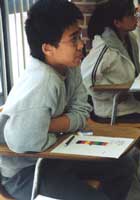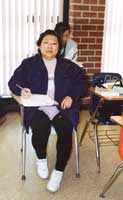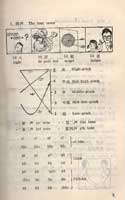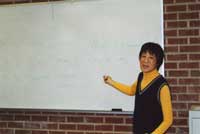|
Bridging the New
Language Gap: Business and Politics Pushing Oakland’s Native Cantonese
Speakers to Study Mandarin
By
Haili Cao
The 17-year-old in gray sweatpants
hunched forward at his Laney College desk and read aloud from his Mandarin
textbook: "Her father is a professor. He is working at the Foreign
Language Institute. Her mother is a doctor." He pronounced each word
carefully in Mandarin, but he had a heavy accent--a Cantonese accent.
Already fluent in Cantonese and English, Ye Zhi-wen is one of a growing
number of Chinese Oakland residents who have decided that mastering one
Chinese dialect is not enough. "The reason I come here to learn Mandarin
is that I want to go to work in China’s high-tech business in the
future," Ye said. "Because there are so many people out there,
and the market is big."
Having lived in Oakland’s Chinatown for nine years, Ye now is bilingual.
He was raised speaking Cantonese, the dominant language of Hong Kong and
the mainland Chinese province of Canton, where his parents lived before
they emigrated.
But Cantonese is quite different from Mandarin, which is the official
language of mainland China and is also the form of Chinese spoken in Taiwan.
The two languages use the same written characters, so Ye can read Mandarin.
But like other native Cantonese speakers, he understands little spoken
Mandarin.
This is not uncommon in Chinatown. Oakland’s Chinatown was settled
more than a century ago by immigrant miners who came mainly from Canton
province. Since Canton borders Hong Kong and uses the same language, it
was easier for people from there to go to Hong Kong than from the rest
of mainland China. During the previous half of this century, when China
was entangled in frequent wars, many Cantonese fled to Hong Kong, at the
time a British colony, sometimes stowing away. Even after the People’s
Republic of China was founded, large numbers of Cantonese continued to
emigrate to Hong Kong to look for a better life, or to use it as a bridge
to the United States, because Hong Kong was a free port.
Cantonese dominance in Chinatown is also due to Chinese government’s
constraints on allowing students or business travelers to go abroad until
China implemented an open policy in the late 1970s. Only in the 1990s
have Chinese flowed into America on a large scale.
Indeed, among Chinese, it is common knowledge that Chinatown is somewhere
a Chinese person can live freely without necessarily speaking English.
Lily Hu, a Mandarin-speaking immigrant from Taiwan who moved to Oakland’s
Chinatown 15 years ago, said living in the community during those years
forced her to learn Cantonese. "At that time, it was almost mandatory,"
said the government relations consultant, who is the former president
of Oakland Chinatown’s Chamber of Commerce. "If you couldn’t
speak Cantonese, people even wouldn’t talk to you."
But economic and political realities are making Mandarin increasingly
important for Oakland residents who rely on business with China.
Jennie Ong, chief executive
director of Oakland Chinatown’s Chamber of Commerce, has taken a
Mandarin course in Piedmont College. "I am forced to learn Mandarin,
because our chamber has invited many Chinese delegations from mainland
China in recent years, and is supposed to invite more," said Ong,
whose Cantonese-speaking family emigrated from Hong Kong.
This string of invitations is the result of more frequent and interactive
trade with mainland China, Ong said. For example, earlier this month the
Chamber of Commerce received an official Mandarin-speaking delegation
from Si-chuan province in southwest China. But Ong still needed an interpreter,
since her limited Mandarin is far from conversational.
Tim, the owner of Chao’s Rosewood furniture, is in a better situation.
The Hong Kong native, who declined to give his last name, once spent several
years in Taiwan and thus can manage Mandarin freely. After more than a
decade in Chinatown, Tim’s shop is one of the three survivors in
Chinatown’s highly competitive furniture market. His customers now
come from as far as Los Angeles and New York, and his business has spread
by word of mouth. Many of his customers outside Chinatown are originally
from mainland China or Taiwan, he said.
"I have to deal with more and more Mandarin-speaking customers,"
Tim said in Mandarin as he attended to a middle-age couple from Shanghai,
who came to the United States eight years ago. They had just bought a
new house in San Jose, and had driven a long way specifically to shop
at Tim’s. Another reason prompting Tim to speak Mandarin is that
he built a factory in southern mainland China several years ago, where
labor is cheap. His products are sold both in America and mainland China.
It is more common to hear Mandarin in the street now. The speakers are
new immigrants from the mainland or Taiwan who have moved to Chinatown.
There are also shoppers from other neighborhoods, such as Chinese students
from UC Berkeley, or high-tech employees from Fremont, where there is
a growing Chinese community. No official statistics are available, though,
about how many new arrivals have come in recent years. Mr. Ke, 75, who
works in Draline Tong Herbs, a Chinese medicine store, said his customers
are nearly divided down middle between the Cantonese speakers and Mandarin
speakers. Having emigrated from Canton province 15 years ago, Ke is fluent
in Cantonese, but only passable in Mandarin.
So in Chinatown lately, Mandarin speakers in shops or restaurants may
still be inconvenienced, but don’t need to worry about being embarrassed,
since a lot of Cantonese speakers can also understand Mandarin.
That’s exactly what Yao Mingzhe, a 85-year-old mainland Chinese immigrant
who had no Cantonese knowledge before, has experienced. Yao came to America
15 years ago by herself with the help of relatives, and has since settled
in Oakland’s Chinatown. She had to get help from an interpreter during
the early years. "But I don’t need it anymore," said Yao
in Mandarin. "I have been able to understand some Cantonese, and
meanwhile, they can also understand Mandarin and are beginning to speak
it now."
"The Chinese students are mainly new immigrants," saied Heather
Ding, 49, foreign language chair at Laney College, where Mandarin is taught
at three different levels. Ding said her students used to be retired Chinese
interested in "the beauty of Chinese culture," but that now
more are driven by practical needs, joined increasingly by American-born
Cantonese-speaking Chinese students.
Lin Wen-liao, 66, is the oldest student in Ding’s beginning class.
He was born in Canton, but once studied at Beijing Foreign Language College,
majoring in Russian. He came to the States six years ago and settled in
Oakland Senior Hotel, a government-subsidized apartment for seniors. Originally
a Chinese teacher in Canton province, Lin planned to continue his career
in America. "I came to learn the way teacher Ding teaches,"
said the gray-haired Lin. "I know there are a number of English speaking
people here who want to learn Chinese."
Some people in Chinatown look to Hong Kong as an example. Since the Chinese
government took over Hong Kong in July 1997, Cantonese speakers there
have started to use Mandarin—not because of a Chinese government
mandate, but because of the frequent business interactions between Hong
Kong and the mainland.
"People don’t learn unless there is a reason to learn,"
said Oakland City Council member Henry Chang. It’s the same in Chinatown.
--Rosemary Hoban assisted in the writing of this article.
Home
|

Ye
Zhi-wen

Winnie
Wong

From the Practical Chinese Reader
Textbook

From
the Practical Chinese Reader Textbook

Heather
Ding
|

